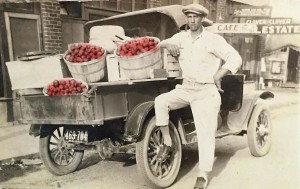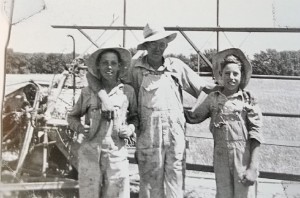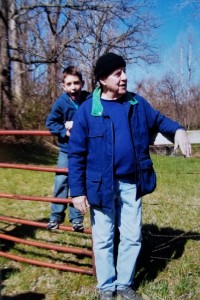
Bryan Kruse, father of William Kruse, sells apples in the southwest Missouri area. The exact date is unkown, but the license plate indicates the photograph was taken circa 1925.
Bretton Cole
Editor-in-Chief
Crowder College is a staple of southwest Missouri, a historical monument of a former military base which now serves as an education institute.
Many in the area are aware of its past as a military base which held German prisoners during World War II. Yet, the history of the area before that is often overlooked. What was Crowder before military and government intervention?
Crowder wasn’t always home to a military base or a college, but it was a place people called home.
Luke Casady, a descendant of the Kruse family and Crowder student, explained how the tale of his family’s displacement has been lost in the chronicles of Crowder history. “The stuff we hear is what other people decide is important for us to hear,” he said.
There is more to the story than the what is always talked about, and Casady and his family feel it is important for that history to resurrect.
“The people that lived here before deserve to be remembered,” he said.

From left to right: James Kruse, Bryan Kruse (father), Joe Kruse (brother). This photo was taken just after the family was relocated to Fairview, Mo.
James E. Kruse, Casady’s great grandfather, wrote a historical account of some of the family’s history in the area. Their history in the area dates back to James’ grandfather, William Kruse, born in Austria, who settled in the Crowder area soon after his marriage to Wilhelmina Prasse in the latter years of the 1800s.
The Kruse family was, in short, uprooted from their homestead when the government came to build Fort Crowder on their land in 1940. In what was essentially an ultimatum, the Kruse family was told they need to leave by Thanksgiving Day in 1941.
Before they were asked to leave, life in the area where Crowder now sits was quiet and calm, yet bubbling with life and activity.
“When driving through the Crowder area today, my mind’s eye sees something totally different from what is actually there. I see June,” Kruse wrote.
“I see June the community, complete with faces and activities marching across my memory… the hub of all our lives, the home of the one telephone which took care of untold calamities in all our lives and announced the joy of births, marriages and other happy events.”
To them, the area wasn’t merely a location geographical situated for government use. It was home.

Luke Casady and his grandfather, James Kruse, on their family’s old land in 2008.
“He built [their] farm from the ground up,” Casady explained. It was a difficult transition both mentally as well as physically. “They were among the last to leave.”
The family relocated to the Fairview area, where many of the family remains today, and the family has not forgotten what happened. It’s an important and valuable piece of history, rich as well as bitter.
Casady is the seventh generation of the Kruse family, and Crowder and its questionable history are still important to him.
“I’ve always felt a sense of home,” he admitted. “Even though this land isn’t my family’s anymore, hundreds of students can still use the land today. That would make my family happy [to know] something great is coming out of it.
Dozens of descendants from the Kruse family have attended Crowder, Casady speculates. Despite being moved off the land, the area remains an important part of f.”amily history.
Crowder is more than meets the eye — it’s a part of southwest Missouri full of rare history, memories and a family bond that survives to this day.

Leave a Reply